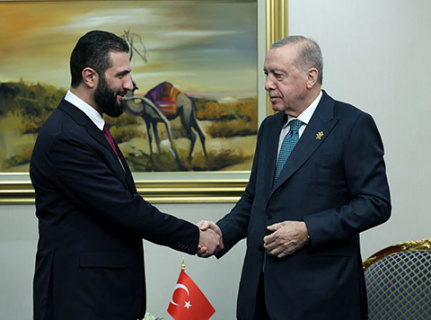
Ankara has intensified its pressure on Syrian Kurdish formations, demanding their integration into a unified Syrian state amidst escalating regional tensions. On October 8, Turkish President Recep Tayyip Erdogan unequivocally stated that Turkey would not tolerate any actions undermining Syria’s territorial integrity. His remarks came in direct response to bloody clashes that erupted this week in Aleppo between Kurdish fighters and forces loyal to the transitional government in Damascus, just days after parliamentary elections were held in Syria, notably excluding Kurdish-controlled areas.
Speaking to journalists upon his return from Azerbaijan, President Erdogan underscored Turkey’s deep-seated commitment to preventing a return to instability in Syria. He specifically addressed the Syrian Democratic Forces (SDF), a Kurdish-dominated military alliance controlling the country’s northeast, urging them to honor previous commitments to unify with the Syrian state. Erdogan cited a March 10 agreement between Damascus and the SDF leadership concerning such a merger, reinforcing Ankara’s steadfast position on Syria’s territorial inviolability.
The recent conflagration in Aleppo saw Kurdish paramilitary units engage in firefights with government forces overnight on October 6-7, triggered by blockades to the Kurdish districts of Ashrafiya and Sheikh Maqsoud. These clashes, the first significant flare-up since the collapse of Bashar al-Assad’s regime on December 8, 2024, spotlighted the fragile peace and unresolved political landscape. Despite the transitional government’s efforts to portray the elections as a departure from the Assad era, the exclusion of SDF-held northeastern regions raised considerable questions.
In the immediate aftermath of the fierce fighting, an SDF delegation led by Commander Mazloum Abdi traveled to Damascus on October 7, reportedly accompanied by US officials. This U.S.-brokered engagement led to a precarious ceasefire. Murhaf Abu Qasra, the Minister of Defense in Syria’s transitional government, confirmed that a comprehensive cessation of hostilities had been agreed upon across all lines of contact in northern and northeastern Syria, effective immediately.
However, the situation continues to deeply concern Ankara, which views any move toward Kurdish autonomy in Syria as an existential threat to its own territorial integrity, given the substantial Kurdish population within Turkey. This apprehension fuels Turkey’s strategic consideration of various scenarios to bolster the Syrian transitional government, an ally it champions, in extending its authority across all Syrian territories.
Further demonstrating Ankara’s proactive approach, Turkish Foreign Minister Hakan Fidan hosted his Syrian counterpart, Asa’ad Al-Sheibani, on October 8. A primary agenda item for their discussions was the pressing issue of integrating Kurdish formations into a unified administrative and military structure within the Syrian Arab Republic. This diplomatic engagement underscores Turkey’s active role in shaping the post-Assad Syrian state.
Adding a provocative dimension to the debate, Devlet Bahçeli, leader of the Nationalist Movement Party (MHP) and a key coalition partner of President Erdogan, suggested that Abdullah Öcalan, the imprisoned founder of the Kurdistan Workers’ Party (PKK), should issue a special appeal from his Turkish island prison to persuade the SDF towards integration and dissolution. This proposal draws on Ankara’s recent success in achieving a degree of reconciliation with the PKK, which has historically waged an armed struggle against the Turkish state. Turkey consistently regards the Syrian Kurdish factions, including the SDF, as direct offshoots of the PKK, believing that any peace process should encompass them, a claim the SDF has repeatedly refuted.
With a stated year-end deadline for the SDF’s integration into the central Syrian government, Turkey is openly contemplating a forceful resolution. Turkish Defense Ministry sources, speaking to the newspaper Türkiye, indicated Ankara’s extreme sensitivity on this matter, signaling a readiness to compel Kurdish formations into compliance. These sources suggest Turkey is prepared to offer full military assistance to the transitional government under President Ahmed al-Shar’a to restore Syria’s complete territorial integrity, highlighting the high stakes and potential for renewed conflict in an already war-torn region.
